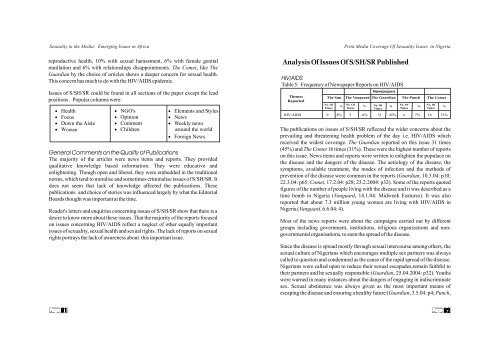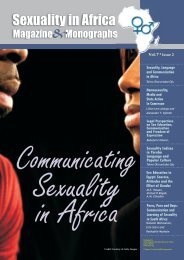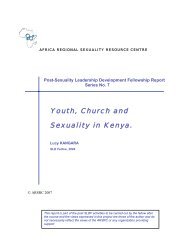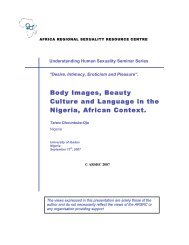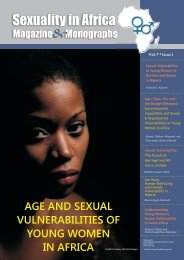Sexuality in Media: Emerging Issues in Africa - Africa Regional ...
Sexuality in Media: Emerging Issues in Africa - Africa Regional ...
Sexuality in Media: Emerging Issues in Africa - Africa Regional ...
Create successful ePaper yourself
Turn your PDF publications into a flip-book with our unique Google optimized e-Paper software.
<strong>Sexuality</strong> <strong>in</strong> the <strong>Media</strong>: Emerg<strong>in</strong>g <strong>Issues</strong> <strong>in</strong> <strong>Africa</strong><br />
reproductive health, 10% with sexual harassment, 6% with female genital<br />
mutilation and 6% with relationships disappo<strong>in</strong>tments. The Comet, like The<br />
Guardian by the choice of articles shows a deeper concern for sexual health.<br />
This concern has much to do with the HIV/AIDS epidemic.<br />
<strong>Issues</strong> of S/SH/SR could be found <strong>in</strong> all sections of the paper except the lead<br />
positions . Popular columns were:<br />
• Health<br />
• Focus<br />
• Down the Aisle<br />
• Woman<br />
• NGO's<br />
• Op<strong>in</strong>ion<br />
• Comment<br />
• Children<br />
• Elements and Styles<br />
• News<br />
• Weekly news<br />
around the world<br />
• Foreign News<br />
General Comments on the Quality of Publications<br />
The majority of the articles were news items and reports. They provided<br />
qualitative knowledge based <strong>in</strong>formation. They were educative and<br />
enlighten<strong>in</strong>g. Though open and liberal, they were embedded <strong>in</strong> the traditional<br />
norms, which tend to moralise and sometimes crim<strong>in</strong>alise issues of S/SH/SR. It<br />
does not seem that lack of knowledge affected the publications. These<br />
publications and choice of stories was <strong>in</strong>fluenced largely by what the Editorial<br />
Boards thought was important at the time.<br />
Reader's letters and enquiries concern<strong>in</strong>g issues of S/SH/SR show that there is a<br />
desire to know more about these issues. That the majority of the reports focused<br />
on issues concern<strong>in</strong>g HIV/AIDS reflect a neglect of other equally important<br />
issues of sexuality, sexual health and sexual rights. The lack of reports on sexual<br />
rights portrays the lack of awareness about this important issue.<br />
Analysis Of <strong>Issues</strong> Of S/SH/SR Published<br />
HIV/AIDS<br />
Table 5: Frequency of Newspaper Reports on HIV/AIDS<br />
Themes<br />
Reported<br />
The Sun The Vanguard The Guardian The Punch The Comet<br />
No. Of<br />
Times<br />
%<br />
Pr<strong>in</strong>t <strong>Media</strong> Coverage Of <strong>Sexuality</strong> <strong>Issues</strong> <strong>in</strong> Nigeria<br />
No. Of<br />
Times<br />
%<br />
Newspapers<br />
No. Of<br />
Times<br />
No. Of<br />
No. Of<br />
% %<br />
%<br />
Times<br />
Times<br />
HIV/AIDS 9 8% 5 6% 31 45% 4 7% 16 31%<br />
The publications on issues of S/SH/SR reflected the wider concerns about the<br />
prevail<strong>in</strong>g and threaten<strong>in</strong>g health problem of the day i.e. HIV/AIDS which<br />
received the widest coverage. The Guardian reported on this issue 31 times<br />
(45%) and The Comet 16 times (31%). These were the highest number of reports<br />
on this issue. News items and reports were written to enlighten the populace on<br />
the disease and the dangers of the disease. The aetiology of the disease, the<br />
symptoms, available treatment, the modes of <strong>in</strong>fection and the methods of<br />
prevention of the disease were common <strong>in</strong> the reports (Guardian, 10.3.04: p10;<br />
22.3.04: p65; Comet, 17.2.04: p28; 23.2.2004: p32). Some of the reports quoted<br />
figures of the number of people liv<strong>in</strong>g with the disease and it was described as a<br />
time bomb <strong>in</strong> Nigeria (Vanguard, 14.1.04: Midweek Features). It was also<br />
reported that about 7.3 million young women are liv<strong>in</strong>g with HIV/AIDS <strong>in</strong><br />
Nigeria (Vanguard. 6.6.04: 4).<br />
Most of the news reports were about the campaigns carried out by different<br />
groups <strong>in</strong>clud<strong>in</strong>g government, <strong>in</strong>stitutions, religious organizations and nongovernmental<br />
organisations, to stem the spread of the disease.<br />
S<strong>in</strong>ce the disease is spread mostly through sexual <strong>in</strong>tercourse among others, the<br />
sexual culture of Nigerians which encourages multiple sex partners was always<br />
called to question and condemned as the cause of the rapid spread of the disease.<br />
Nigerians were called upon to reduce their sexual escapades,rema<strong>in</strong> faithful to<br />
their partners and be sexually responsible (Guardian, 25.04.2004: p32). Youths<br />
were warned <strong>in</strong> many <strong>in</strong>stances about the dangers of engag<strong>in</strong>g <strong>in</strong> <strong>in</strong>discrim<strong>in</strong>ate<br />
sex. Sexual abst<strong>in</strong>ence was always given as the most important means of<br />
escap<strong>in</strong>g the disease and ensur<strong>in</strong>g a healthy future (Guardian, 3.5.04: p4; Punch,


